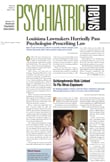A federal judge has dismissed the American Medical Association as a defendant in a lawsuit challenging the legality of the National Resident Matching Program (NRMP). The judge indicated that the plaintiffs failed to explain how they contend the AMA was involved in the conspiracy they allege has taken place regarding the match.
Still remaining as defendants in the lawsuit are the NRMP, Accreditation Council for Graduate Medical Education (ACGME), Association of American Medical Colleges (AAMC), and 27 teaching hospitals.
The suit was filed in 2002 in U.S. District Court for the District of Columbia by three physicians—two residents and a research fellow—who have asked the court to certify the suit as a class action, with the class consisting of all physicians who completed a residency or fellowship program accredited by the ACGME since May 7, 1998.
The suit alleges that the match program violates federal antitrust laws and that the defendants—all of which are involved in the match program—conspire to stifle competition among residents for available training slots. According to the suit, competition is stifled because the teaching hospitals and the resident match program share salary data and other terms of employment that affect residents. In addition, the ACGME establishes rules for residency training, and the programs have to comply if they want accreditation.
The result of these alleged actions, the plaintiffs contend, is to keep resident salaries at an unreasonably low level, since residents have no say in negotiating salaries and working conditions. If they participate in the match, they have to accept the pay and working conditions; if they don’t enter the match, they have little chance to compete for slots in the training programs of their choice (Psychiatric News, June 7, 2002).
APA President Michelle Riba, M.D., who has been extensively involved in resident training, told Psychiatric News that at the heart of the legal wrangling is whether the court decides residents are employees or students. “We in the education world, and those of us who administer training programs, view the incoming [residents] as trainees,” that is, as students more than as hired hands. “That is why the ACGME and AAMC have such important roles in this process—because it truly is an education process.”
It would be unfortunate if this suit succeeds, she said. “One would have to have a very short memory to want to go back to the ‘old days’ when the fourth year of medical school education became overrun by students having to fend for themselves. . . by spending considerable time and money negotiating with individual training directors” whose program they wanted to enter.
Medical school deans and the AAMC, Riba emphasized, “helped enormously in taking back the fourth year of medical school for education.” ▪
